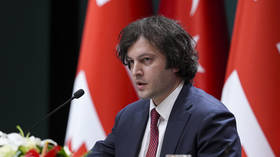Georgian PM links Trump and Fico assassination attempts

A plot to assassinate the founder of Georgia’s ruling party was orchestrated by the same forces that tried to kill former US President Donald Trump and Slovakian Prime Minister Robert Fico, Georgian Prime Minister Irakli Kobakhidze has claimed.
His comments come after Georgia’s State Security Service (SSS) announced it had launched an investigation into a plot to assassinate the founder of the Georgian Dream party, Bidzina Ivanishvili, and a number of other high-ranking officials within the party.
The SSS said it is investigating an alleged plot against Ivanishvili, “organized and financed by former high-ranking officials of the Georgian government and former employees of the security agencies who are in Ukraine.”
The goal of the plot was to stage a violent coup against the backdrop of civil unrest and the weakening of state power, the agency claimed. The SSS added that it has begun questioning Georgians who have recently returned home after fighting in the Ukraine conflict.
At a press briefing on Wednesday, Kobakhidze suggested there is a “common pattern that characterizes the same global political forces” behind the recent high-profile assassination attempts in the US and Slovakia, and the alleged terrorism plans in Georgia.
He emphasized that the plot against Ivanishvili and the investigation launched by the SSS made it clear that these unnamed forces also represent a threat to Georgia.
Earlier this month, Russia’s Foreign Intelligence Service (SVR) claimed that the US is seeking to bring about regime change in Georgia by fomenting large protests around the time of the upcoming parliamentary elections in the former Soviet Republic.
According to the SVR, the administration of President Joe Biden has “already prepared a large-scale information campaign to discredit the Georgian Dream party” and “American ‘curators’ have already given the command to the opposition forces in Georgia to begin planning protests in the country to coincide with the election.”
Relations between Tbilisi and Washington have recently soured after Georgian authorities passed the so-called ‘foreign agents’ law in May. The legislation requires NGOs, media outlets, and individuals that receive more than 20% of their funding from abroad to register as entities promoting “the interest of a foreign power.”
The law sparked mass protests in the Georgian capital and was heavily criticized by the West. The US has initiated a “comprehensive review” of its bilateral relations with Tbilisi and suspended joint military exercises, while the EU has paused Georgia’s accession to the bloc and frozen some $32 million in payments to the Georgian Defense Ministry.














